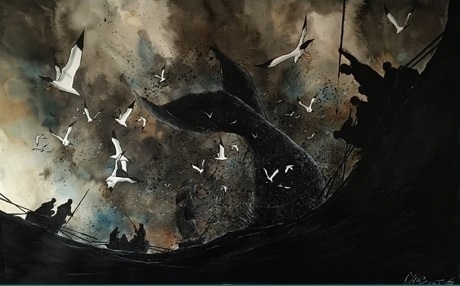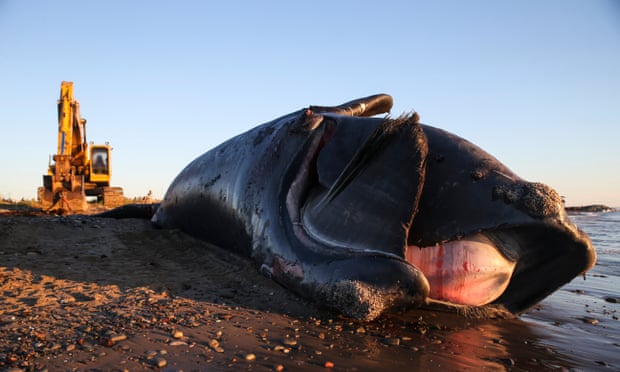A blue whale's heart sometimes only beats around twice a minute
Listen to it on the embedded video #whales #nature #marinebiology
https://www.vox.com/down-to-earth/2022/8/11/23291991/largest-animal-blue-whale-heartbeat/
Listen to it on the embedded video #whales #nature #marinebiology
https://www.vox.com/down-to-earth/2022/8/11/23291991/largest-animal-blue-whale-heartbeat/

The #ChrisHedges Report
https://therealnews.com/moby-dick-and-the-soul-of-american-capitalism
https://chrishedges.substack.com/p/the-chris-hedges-report-podcast-nathaniel
https://yewtu.be/watch?v=HEP86KPd0Cs
#nathanielphilbrick #discussion #hermanmelville #book #mobydick #whale #whales #environment #capitalism #transcript #podcast #audio #video

The original “Songs of the Humpback Whale” by Dr. Roger Payne.
If you are interested in how whale song research started, here is the audio recording from the pioneering research on whale songs by Dr. Roger Payne. I bought this album in 1972 after hearing it in a biology class. The Capitol album is titled: “Songs of the Humpback Whale” ©1970. I cleaned and restored my old album with using a CleanLP kit before digitizing. This is the finest audio copy of Song of the Humpback Whale I have heard so far.
early seventies I played'em in the disco I worked... tune by tune after Hendrix, Kevin Ayers, Soft Machine etc...
#songs #whales #humpback-whales #nature #beauty
Humpy is back and firing on all cylinders! (fuck, they're noisy)
Song of the Whale (by Eric Bogel) from back when we started saving the species: https://youtu.be/8VZAb9I0LLs
#HUZZAH #whales #Good-News #unendangered
#biology #animals #whales #orcas #bluewhales
Orcas Documented Killing Blue Whales And Eating Their Tongues in a World First
https://www.sciencealert.com/australian-study-scientifically-documents-orcas-killing-blue-whales-in-world-first
● NEWS ● #MexicoNewsDaily #Nature ☞ Marines rescue 3 #whales trapped in nets off Acapulco https://mexiconewsdaily.com/news/marines-rescue-3-whales-trapped-in-nets-off-acapulco/
● NEWS ● #CounterPunch #Climate #Wildlife #Nature ☞ #Whales Could Save the World’s Climate, Unless the Military Destroys Them First https://www.counterpunch.org/2021/12/16/whales-could-save-the-worlds-climate-unless-the-military-destroys-them-first/
Please urge Shell to stop seismic blasting of the Wild Coast of South Africa
#Shell #FossilFuel #BigOil #SouthAfrica #Whales #SeismicBlasting #Greenpeace #Petition
"Shell is about to start blasting extremely loud shockwaves into the oceans off the Wild Coast of South Africa - a fragile and beautiful ecosystem that is a vital whale breeding ground.
Each shockwave blasted in this “seismic testing” is louder than a space shuttle launch, and local whales, dolphins, turtles and seals will be subjected to this excruciating noise every 10 seconds, for five whole months, in whale mating season.
Here in Aotearoa, we have fought the oil industry on this and won. But its destructive search for new oil and gas is never-ending - despite scientists warning that we can’t afford to burn even the known oil reserves, let alone new ones.
But all is not lost - in their thousands, South Africans are fighting back against Shell. Coastal communities, Greenpeace, environmentalists and concerned members of the public have all joined forces to stand up to Shell.
These seismic detonations could have a devastating impact on the health of marine life, and if successful, the operations would potentially disrupt the local communities that depend on eco-tourism and fishing for their livelihoods.
We’ve defeated Shell before - in 2015, our people-powered “Save the Arctic” campaign forced them to give up their plans for oil drilling in the Arctic, and here in Aotearoa we resisted and prevented their deep sea oil exploration plans from going ahead.
Ngā mihi nui,
Nick and the whole crew at Greenpeace Aotearoa"
#Biology #Zoology #Wildlife #SpermWhale #Cetaceans #MarineMammal

https://www.youtube.com/watch?v=r9PeYPHdpNo
'Our #coastal #seas are a #rich #community of #plants and #animals #working #together, all of which are #vital to the #health of our #planet and #humanity. From fearsome #sharks to lowly #urchins, 90 percent of #marine #creatures live in coastal #waters. #Protecting these #habitats is a battle humanity must win. Coastal seas count for 7% of our #ocean, yet they are responsible for 95% of the #world’s marine #production – these are our #planet’s #fishing #grounds. Despite their importance to humanity, few are protected. Yet wherever effective #protection #exists, #life bounces back in #huge #abundance. The #wildlife will #thrive, and we will catch more #fish.'
#ourplanet #documentary #sirdavidattenborough #davidattenborough #planet #earth #nature #beauty #natural #world #climate #coral #reefs #seagrass #mangroves #kelp-forests #fur-seals #sea-lions #dolphins #wrasse #otters #bald-eagles #humpback #whales #herring #north-sea #australia #great-barrier-reef #french-polynesia #everglades #california #alaska #sanctuaries
George Monbiot (The Guardian)
It is simply not possible to carry on at the current level of economic activity without destroying the environment.
There is a box labelled “climate”, in which politicians discuss the climate crisis. There is a box named “biodiversity”, in which they discuss the biodiversity crisis. There are other boxes, such as pollution, deforestation, overfishing and soil loss, gathering dust in our planet’s lost property department. (...)
Nature recognises no such divisions. As Earth systems are assaulted by everything at once, each source of stress compounds the others.
Take the situation of the North Atlantic right whale, whose population recovered a little when whaling ceased, but is now slumping again: fewer than 95 females of breeding age remain. (...)
Studies of bees show that when pesticides are combined, their effects are synergistic: in other words, the damage they each cause isn’t added, but multiplied. When pesticides are combined with fungicides and herbicides, the effects are multiplied again. (...)
When rainforests are fragmented by timber cutting and cattle ranching, and ravaged by imported tree diseases, they become more vulnerable to the droughts and fires caused by climate breakdown.
What would we see if we broke down our conceptual barriers? We would see a full-spectrum assault on the living world. Scarcely anywhere is now safe from this sustained assault. A recent scientific paper estimates that only 3% of the Earth’s land surface should now be considered “ecologically intact”.
The various impacts have a common cause: the sheer volume of economic activity. (...)
When we box up this predicament, our efforts to solve one aspect of the crisis exacerbate another. For example, if we were to build sufficient direct air capture machines to make a major difference to atmospheric carbon concentrations, this would demand a massive new wave of mining and processing for the steel and concrete. (...)
Or look at the materials required for the electronics revolution that will, apparently, save us from climate breakdown. Already, mining and processing the minerals required for magnets and batteries is laying waste to habitats and causing new pollution crises. Now, as Jonathan Watts’s terrifying article in the Guardian this week shows, companies are using the climate crisis as justification for extracting minerals from the deep ocean floor, long before we have any idea of what the impacts might be. (...)
But there is no such thing as green growth. Growth is wiping the green from the Earth.
We have no hope of emerging from this full-spectrum crisis unless we dramatically reduce economic activity. (...) Sustaining our life-support systems means doing less of almost everything. But this notion – that should be central to a new, environmental ethics – is secular blasphemy.

‘Combined impacts are laying waste to entire living systems.’ A dead North Atlantic right whale washed up on a beach in New Brunswick, Canada. Photograph: Nathan Klima/Boston Globe/Getty Images.
Tags: #environment #climate #climate_change #climate_crisis #co2 #pollution #global_warming #economy #growth #green_growth #deforestation #overfishinh #soil_loss #biodiversity #whales #insects #bees #agriculture #fertilizers #fungicides #herbicides #caterpillars #moths #coral_reef #coral_bleeching #rainforest #timber_cutting #cattle_racnhing #trees #mining #deep_sea_mining #ocean_levels #floods #sea_levels
● NEWS ● #CommonDreams ☞ Experts Warn #NOAA Plan Might 'Delay' Right #Whales #Extinction , But Not Save Them https://www.commondreams.org/news/2021/08/31/experts-warn-noaa-plan-might-delay-right-whales-extinction-not-save-them
Good news in a way but also driven by #GlobalWarming


https://www.youtube.com/watch?v=cTQ3Ko9ZKg8
#ourplanet #frozenworlds #frozen #worlds #documentary #sirdavidattenborough #attenborough #earth #nature #planet #beauty #natural #world #antarctica #arctic #sea-ice #krill #kelp #polar-bears #walruses #ring #seals #king #penguins #gentoos #humpback #whales #orca #narwhals #albatross #ice #life #climatechange #science #ecology #diversity